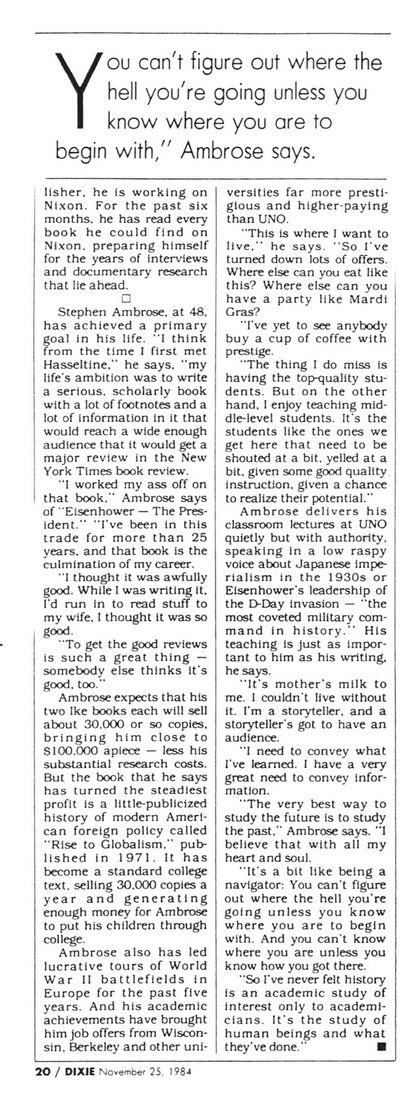This text was obtained via automated optical character recognition.
It has not been edited and may therefore contain several errors.
You can't figure out where the hell you're going unless you know where you are to begin with," Ambrose says. lisher. he is working on Nixon. For the past six months, he has read every book he could find on Nixon, preparing himself for the years of Interviews and documentary research that lie ahead. ? Stephen Ambrose, at 48. has achieved a primary goal In his life. "1 think from the time I first met Hasseltine," he says, "my life's ambition was to write a serious, scholarly book with a lot of footnotes and a lot of Information in it that would reach a wide enough audience that It would get a major review in the New York Times book review. "I worked my ass off on that book," Ambrose says of "Eisenhower ? The President." "I?ve been in this trade for more than 25 years, and that book Is the culmination of my career. "I thought it was awfully good. While I was writing it. I'd run in to read stuff to my wife. I thought it was so good. "To get the good reviews is such a great thing ? somebody else thinks It's good.too." Ambrose expects that his two Ike books each will sell about 30.000 or so copies, bringing him close to S100.000 apiece ? less his substantial research costs. But the book that he says has turned the steadiest profit is a little-publicized history of modern American foreign policy called "Rise to Globalism." published in 1971. It has become a standard college text, selling 30.000 copies a year and generating enough money for Ambrose to put his children through college. Ambrose also has led lucrative tours of World War II battlefields In Europe for the past five years. And his academic achievements have brought him job offers from Wisconsin. Berkeley and other uni- versities far more prestigious and higher-paying than UNO. "This Is where I want to live,'' he says. "So I've turned down lots of ofTers. Where else can you eat like this? Where else can you have a party like Mardl Gras? "I've yet to see anybody buy a cup of coffee with prestige. "The thing I do miss is having the top-quality students. But on the other hand. I enjoy teaching middle-level students. It's the students like the ones we get here that need to be shouted at a bit. yelled at a bit, given some good quality Instruction, given a chance to realize their potential." Ambrose delivers his classroom lectures at UNO quietly but with authority, speaking in a low raspy voice about Japanese Imperialism in the 1930s or Eisenhower's leadership of the D-Day invasion ? ?the most coveted military command in history.? His teaching Is just as important to him as his writing, he says. "It's mother's milk to me. 1 couldn't live without it. I'm a storyteller, and a storyteller's got to have an audience. "I need to convey what I've learned. I have a very great need to convey Information. "The very best way to study the future Is to study the past." Ambrose says. "I believe that with all my heart and soul. "It's a bit like being a navigator: You can't figure out where the hell you're going unless you know where you are to begin with. And you can't know where you are unless you know how you got there. "So I've never felt history is an academic study of Interest only to academicians. It's the study of human beings and what they've done." ? 20 / DIXIE November 25. 1984

Ambrose, Stephen Dixie-Magazine-Times-Picayune-11-25-84-006